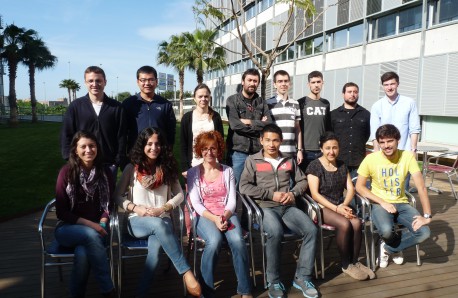Martín
Research group

Research abstract
The major goal in the Martin group is to provide solutions to relevant and challenging synthetic problems from the scientific and industrial standpoint, without losing sight its environmental impact. In order to meet these challenges, the group is mainly focused on the metal-catalyzed, selective activation of relatively inert entities of great significance, such as CO2, C-H bonds, C-C bonds and C-O bonds, as these motifs rank amongst the most widespread and fundamental linkages in organic chemistry.
We are also interesting on the design and implementation of metal-catalyzed domino reactions since a high degree of molecular complexity can be achieved in a one-step, hence allowing a rapid access to key backbones occurring in many natural products.
Topics addressed
- Ni-catalyzed reductive cleavage of C-OMe Bonds
- Metal-catalyzed C-H bond-functionalization
- Metal-catalyzed C-C bond-functionalization
- Ni-catalyzed CO2 Activation
Articles
“Ni-catalyzed decarbonylative C-H coupling reactions: A strategy for preparing bis(heteroaryl) backbones”
Angew. Chem. Int. Ed. 2013, 52, 1878-1880
Correa, A.; Cornella, J. ; Martin, R.
“Formal g-alkynylation of ketones via Pd-catalyzed C-C cleavage”
Chem. Commun. 2013, 49, 4286-4288
Ziadi, A.; Correa, A.; Martin, R.
“Combined experimental and theoretical study on the reductive cleavage of inert C-O bonds with silanes: ruling out a classical Ni(0)/Ni(II) catalytic couple and evidence for Ni(I) intermediates”
J. Am. Chem. Soc. 2013, 135, 1997-2009
Cornella, J.; Gómez-Bengoa, E.; Martin, R.
“Ni-catalyzed direct carboxylation of benzyl halides with CO2”
J. Am. Chem. Soc. 2013, 135, 1221-1224
León, T.; Correa, A.; Martin, R.
“Recent advances in the synthesis and application of benzocyclobutenones and related compounds”
Synthesis 2013, 45, 563-580
Flores-Gaspar, A; Martin, R.
“Ni-catalyzed stereoselective arylation of inert C-O bonds at low temperatures”
Org. Lett. 2013, 15, 6298-6301
Cornella, J.; Martin, R.
“Fe-catalyzed regiodivergent [1,2]-shift of a-aryl aldehydes”
J. Am. Chem. Soc. 2013, 135, 12576-12579
Gutiérrez-Bonet, A.; Flores-Gaspar, A.; Martin, R.
“Cu-catalyzed mild C(sp2)-H functionalization assisted by carboxylic acids en route to hydroxylated arenes”
J. Am. Chem. Soc. 2013, 135, 9350-9353
Gallardo-Donaire, J.; Martin, R.